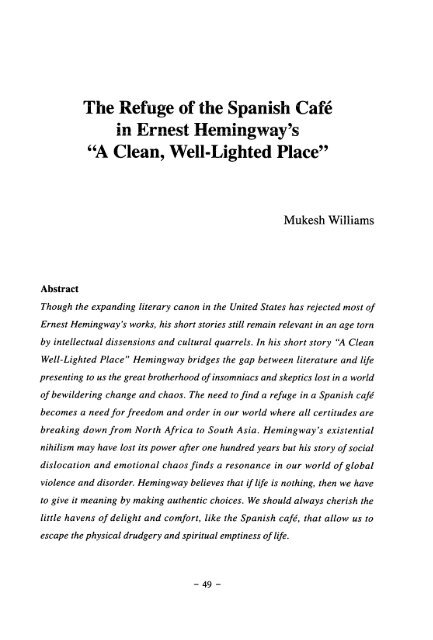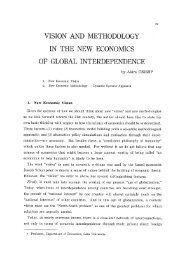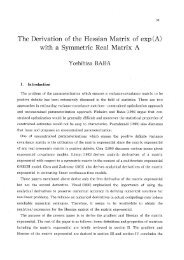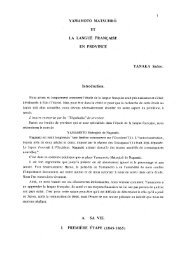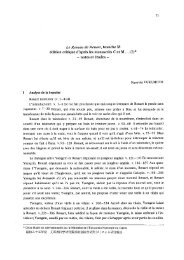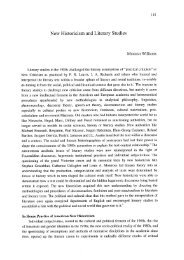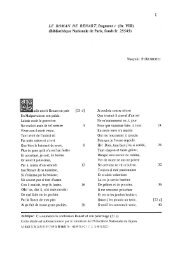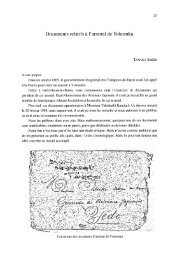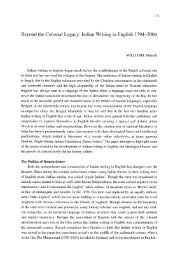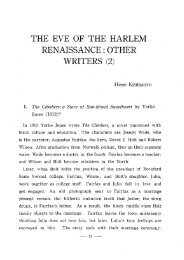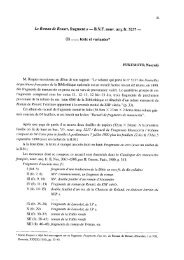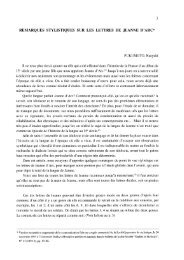Refuge of the Spanish Café in Ernest Hemingway's Clean, Well ...
Refuge of the Spanish Café in Ernest Hemingway's Clean, Well ...
Refuge of the Spanish Café in Ernest Hemingway's Clean, Well ...
Create successful ePaper yourself
Turn your PDF publications into a flip-book with our unique Google optimized e-Paper software.
Abstract<br />
The<br />
"A<br />
<strong>Refuge</strong> <strong>of</strong> <strong>the</strong> <strong>Spanish</strong> <strong>Café</strong><br />
<strong>in</strong> <strong>Ernest</strong> Hem<strong>in</strong>gway's<br />
<strong>Clean</strong>, <strong>Well</strong>-Lighted Place"<br />
Mukesh Williams<br />
Though <strong>the</strong> expand<strong>in</strong>g literary canon <strong>in</strong> <strong>the</strong> United States has rejected most <strong>of</strong><br />
<strong>Ernest</strong> Hem<strong>in</strong>gway's works, his short stories still rema<strong>in</strong> relevant <strong>in</strong> an age torn<br />
by <strong>in</strong>tellectual dissensions and cultural quarrels. In his short story "A <strong>Clean</strong><br />
<strong>Well</strong>-Lighted Place" Hem<strong>in</strong>gway bridges <strong>the</strong> gap between literature and life<br />
present<strong>in</strong>g to us <strong>the</strong> great bro<strong>the</strong>rhood <strong>of</strong> <strong>in</strong>somniacs and skeptics lost <strong>in</strong> a world<br />
<strong>of</strong> bewilder<strong>in</strong>g change and chaos. The need to f<strong>in</strong>d a refuge <strong>in</strong> a <strong>Spanish</strong> café<br />
becomes a need for freedom and order <strong>in</strong> our world where all certitudes are<br />
break<strong>in</strong>g down from North Africa to South Asia. Hem<strong>in</strong>gway's existential<br />
nihilism may have lost its power after one hundred years but his story <strong>of</strong> social<br />
dislocation and emotional chaos f<strong>in</strong>ds a resonance <strong>in</strong> our world <strong>of</strong> global<br />
violence and disorder. Hem<strong>in</strong>gway believes that if life is noth<strong>in</strong>g, <strong>the</strong>n we have<br />
to give it mean<strong>in</strong>g by mak<strong>in</strong>g au<strong>the</strong>ntic choices. We should always cherish <strong>the</strong><br />
little havens <strong>of</strong> delight and comfort, like <strong>the</strong> <strong>Spanish</strong> café, that allow us to<br />
escape <strong>the</strong> physical drudgery and spiritual empt<strong>in</strong>ess <strong>of</strong> life.<br />
- 49 -
In <strong>the</strong> wake <strong>of</strong> new global realities, cultural homogenization, and <strong>in</strong>tellectual<br />
schisms <strong>the</strong> dist<strong>in</strong>ctive appeal <strong>of</strong> post-war American writ<strong>in</strong>g and <strong>the</strong> existentialist<br />
ideology it spawned over a hundred years ago have lost <strong>the</strong>ir appeal. Even<br />
American literary editors have sidel<strong>in</strong>ed <strong>the</strong> angst <strong>of</strong> white male writers from<br />
William Faulkner to Saul Bellow. The rise <strong>of</strong> muscular fem<strong>in</strong>ism, political<br />
multiculturalism and Foucauldian scrut<strong>in</strong>y has given a tough fight to apologists<br />
<strong>of</strong> <strong>the</strong> old literary canon. To be politically correct most literary anthologies shy<br />
away from Hem<strong>in</strong>gway's longer fiction and <strong>in</strong>stead prefer slave narratives, ethnic<br />
writ<strong>in</strong>gs, Native American remembrances and kitchen stories. The Norton<br />
Anthology <strong>of</strong> American Literature first published <strong>in</strong> 1979 by W. W. Norton and<br />
Company, which we have all read with relish as students, has become redundant<br />
now. It has been replaced <strong>in</strong> many American universities by <strong>the</strong> authoritative and<br />
volum<strong>in</strong>ous compendium The Heath Anthology <strong>of</strong> American Literature <strong>in</strong> two<br />
volumes edited by Paul Lauter. The Heath Anthology has hundreds <strong>of</strong> pages <strong>of</strong><br />
slave narrative, women writ<strong>in</strong>g and ethnic literature but just a short story "Hills<br />
Like White Elephants" (1927) and fictional extract from A Farewell to Arms<br />
(1927) by Hem<strong>in</strong>gway.<br />
For a writer who had won <strong>the</strong> Nobel Prize for Literature <strong>in</strong> 1954 and spawned a<br />
host <strong>of</strong> Hem<strong>in</strong>gway clones, a short story and an extract from a novel is too<br />
modest a representation. Even <strong>the</strong> novella The Old Man and <strong>the</strong> Sea (1952) cited<br />
by <strong>the</strong> Swedish Academy for its "powerful, style-form<strong>in</strong>g" narration is omitted<br />
from The Heath Anthology. The reconfiguration <strong>of</strong> American authors and<br />
literary texts represents <strong>the</strong> chang<strong>in</strong>g and expand<strong>in</strong>g canon <strong>of</strong> American<br />
literature over <strong>the</strong> last three decades. But some <strong>of</strong> Hem<strong>in</strong>gway still survives even<br />
if it does through his short stories. Though his stories express his "lonely life,"<br />
hard dr<strong>in</strong>k<strong>in</strong>g and bouts <strong>of</strong> depression <strong>the</strong>y have an abid<strong>in</strong>g symbolic value and<br />
appeal which transcend historical time and cultural specificity. His stories<br />
- 50 -
epresent <strong>the</strong> "great bro<strong>the</strong>rhood" <strong>of</strong> <strong>in</strong>somniacs and skeptics <strong>of</strong> <strong>the</strong> early<br />
twentieth century who are still <strong>in</strong> great numbers today (Baker, 1980 123).<br />
Hem<strong>in</strong>gway's characters still rema<strong>in</strong> relevant to us <strong>in</strong> a hardened reality <strong>of</strong> global<br />
violence and chaos.<br />
Express<strong>in</strong>g <strong>the</strong> angst <strong>of</strong> <strong>the</strong> Lost Generation immediately after World War I,<br />
American writers like Hem<strong>in</strong>gway and Gertrude Ste<strong>in</strong> reflected upon <strong>the</strong> mood<br />
and temper <strong>of</strong> a disillusioned society while liv<strong>in</strong>g <strong>in</strong> Paris and o<strong>the</strong>r European<br />
cities. Their angst was fur<strong>the</strong>r compounded by <strong>the</strong> economic depression,<br />
disbelief <strong>in</strong> traditional Christian values <strong>of</strong> stability and compassion and general<br />
disregard for <strong>the</strong> old. Hem<strong>in</strong>gway wished to believe that even though <strong>the</strong> old<br />
world had vanished, modern life could still reta<strong>in</strong> its civility and concern for<br />
o<strong>the</strong>rs. The world depressed him so much that he began gett<strong>in</strong>g electric shocks<br />
for his condition at Mayo Cl<strong>in</strong>ic which fur<strong>the</strong>r added to his general sense <strong>of</strong><br />
despair (Burwell, 1999 xxiii). Carlos Baker believes that <strong>the</strong> story "A <strong>Clean</strong><br />
<strong>Well</strong>-Lighted Place" "<strong>of</strong>fered a brief look <strong>in</strong>to <strong>the</strong> underside <strong>of</strong> <strong>Ernest</strong>'s spiritual<br />
world, <strong>the</strong> noth<strong>in</strong>gness by which he was still occasionally haunted" (Baker, 1969<br />
238). Hem<strong>in</strong>gway began to suffer from hypertension and <strong>in</strong>somnia and<br />
compla<strong>in</strong>ed about his wife's expenses. He became paranoid that <strong>the</strong> FBI was<br />
secretly listen<strong>in</strong>g to his conversations. The "clean" and "well-lit" café became<br />
<strong>the</strong> last symbolic retreat for his characters, those who had lost mean<strong>in</strong>g <strong>in</strong> life.<br />
The need for a refuge is <strong>in</strong>extricably connected to light and freedom that has an<br />
<strong>in</strong>dubitable r<strong>in</strong>g <strong>in</strong> modern times when once aga<strong>in</strong> all certitudes are break<strong>in</strong>g<br />
down from South Asia to North Africa. Hem<strong>in</strong>gway wrote a dozen novels a<br />
century ago but his f<strong>in</strong>ely chiseled short stories—written <strong>in</strong> an unobtrusive style,<br />
br<strong>in</strong>g<strong>in</strong>g reality and symbol toge<strong>the</strong>r—, capture <strong>the</strong> unspoken psychological<br />
anxiety <strong>of</strong> a generation enamored by <strong>the</strong> n<strong>in</strong>eteenth century existentialism <strong>of</strong><br />
— 51 —
Soren Kierkegaard and Friedrich Nietzsche. In <strong>the</strong> aftermath <strong>of</strong> <strong>the</strong> First World<br />
War writers and ord<strong>in</strong>ary folks were <strong>in</strong>quir<strong>in</strong>g <strong>in</strong>to <strong>the</strong> mean<strong>in</strong>g <strong>of</strong> life, a<br />
mean<strong>in</strong>g divorced from religion and ideology. They were seek<strong>in</strong>g answers to who<br />
<strong>the</strong>y were and why <strong>the</strong>y were here?<br />
Set aga<strong>in</strong>st <strong>the</strong> backdrop <strong>of</strong> social dislocation and emotional loss <strong>in</strong> <strong>the</strong> wake <strong>of</strong><br />
<strong>the</strong> First World War, Hem<strong>in</strong>gway's short story "A <strong>Clean</strong> <strong>Well</strong>-Lighted Place,"<br />
published <strong>in</strong> 1926, captures <strong>the</strong> physical lonel<strong>in</strong>ess and spiritual disillusionment<br />
<strong>of</strong> old age (Hem<strong>in</strong>gway, 1987 228-291). The writer expresses his <strong>in</strong>dubitable<br />
existential nihilism through <strong>the</strong> old man and <strong>the</strong> old <strong>Spanish</strong> waiter, two<br />
characters who are pitted aga<strong>in</strong>st <strong>the</strong> positive realism <strong>of</strong> <strong>the</strong> young waiter. Both<br />
<strong>the</strong> aged characters tell us <strong>in</strong> <strong>the</strong>ir different ways that we cannot place an order<br />
on life. The short story tells <strong>the</strong> tale <strong>of</strong> a deaf man <strong>in</strong> his eighties, who suffers<br />
from <strong>in</strong>somnia, has lost his belief <strong>in</strong> Christianity and probably has no friends or<br />
place to go to. Instead <strong>of</strong> buy<strong>in</strong>g a bottle <strong>of</strong> liquor and go<strong>in</strong>g home to dr<strong>in</strong>k, he<br />
sits late <strong>in</strong> a small café <strong>in</strong> Spa<strong>in</strong> which is about to close. He orders glass after<br />
glass <strong>of</strong> brandy to <strong>the</strong> chagr<strong>in</strong> <strong>of</strong> one <strong>of</strong> one <strong>of</strong> <strong>the</strong> waiters who wants to close <strong>the</strong><br />
café and go home. The story reveals a deep-seared sense <strong>of</strong> angst. Lack<strong>in</strong>g <strong>the</strong><br />
ability to shape our lives, we despair as death is about to overtake us.<br />
Hem<strong>in</strong>gway's own experience <strong>in</strong> <strong>the</strong> First World War <strong>in</strong> Spa<strong>in</strong> and Italy gave him<br />
<strong>the</strong> skill to place his philosophy <strong>in</strong> a spiritually uncerta<strong>in</strong> world.<br />
For <strong>the</strong> old man <strong>the</strong> <strong>Spanish</strong> café is his last refuge. Reticent and withdrawn <strong>the</strong><br />
old man visits <strong>the</strong> café only to withdraw fur<strong>the</strong>r <strong>in</strong>to its shadows. He likes to sit<br />
late <strong>in</strong> <strong>the</strong> café "because he was deaf and now at <strong>the</strong> night it was quiet and he felt<br />
<strong>the</strong> difference (Hem<strong>in</strong>gway, 1987 228)." He listens to <strong>the</strong> throbb<strong>in</strong>g lonel<strong>in</strong>ess <strong>of</strong><br />
<strong>the</strong> night to assuage his anxiety and forget his <strong>in</strong>somnia. Though he has lots <strong>of</strong><br />
money he loses hope <strong>of</strong> ever spend<strong>in</strong>g it. He leads a lonely existence and has<br />
- 52 -
ecently attempted suicide. But he has been saved by his niece. The café is his<br />
last sanctuary as all his o<strong>the</strong>r options are clos<strong>in</strong>g down. He has lost hope, but<br />
only needs a clean, well-lighted place to spend his time.<br />
Both Hem<strong>in</strong>gway and his biographer Carlos Baker were fond <strong>of</strong> this short story<br />
see<strong>in</strong>g <strong>in</strong> it a "triumph <strong>in</strong> <strong>the</strong> realm <strong>of</strong> practical aes<strong>the</strong>tics." Baker extolled <strong>the</strong><br />
virtues <strong>of</strong> <strong>the</strong> story call<strong>in</strong>g it <strong>the</strong> "remarkable union <strong>of</strong> <strong>the</strong> naturalistic and <strong>the</strong><br />
symbolic" where "light, cleanl<strong>in</strong>ess and order" stand aga<strong>in</strong>st <strong>the</strong> "dark chaos <strong>of</strong><br />
society" (Baker, 1980 123-4). Public spaces that br<strong>in</strong>g people toge<strong>the</strong>r are great<br />
<strong>the</strong>rapeutic cl<strong>in</strong>ics <strong>of</strong> modern society that help to re<strong>in</strong>vigorate its members<br />
<strong>of</strong>fer<strong>in</strong>g <strong>the</strong>m companionship and hope.<br />
The <strong>Spanish</strong> <strong>Café</strong><br />
The <strong>Spanish</strong> café always boasted <strong>of</strong> a friendly atmosphere where lonely people<br />
could f<strong>in</strong>d warmth <strong>in</strong> toge<strong>the</strong>rness and at <strong>the</strong> same time dr<strong>in</strong>k alone. But <strong>the</strong><br />
patience and warmth <strong>of</strong> <strong>the</strong> café is tested at around 3 a.m. when <strong>the</strong> old man<br />
orders for ano<strong>the</strong>r dr<strong>in</strong>k. Early <strong>in</strong> 1918 when Hem<strong>in</strong>gway was a teenager he<br />
began work<strong>in</strong>g as an ambulance driver for <strong>the</strong> Red Cross <strong>in</strong> Italy. He was caught<br />
<strong>in</strong> <strong>the</strong> midst <strong>of</strong> <strong>the</strong> rag<strong>in</strong>g war <strong>in</strong> Milan and saw people killed by shrapnel<br />
wounds. He was also <strong>in</strong>jured and fell <strong>in</strong> love with a nurse while recuperat<strong>in</strong>g, but<br />
she chose ano<strong>the</strong>r man. Hem<strong>in</strong>gway was devastated and later began to have<br />
difficulty <strong>in</strong> his relationship with women.<br />
With a characteristic understatement Hem<strong>in</strong>gway tells us how old men no longer<br />
f<strong>in</strong>d <strong>the</strong> promises <strong>of</strong> <strong>the</strong> Catholic tradition plausible. Though we do not come to<br />
know what <strong>the</strong> old man is th<strong>in</strong>k<strong>in</strong>g, we do know that he had been <strong>in</strong> some k<strong>in</strong>d <strong>of</strong><br />
existential "despair." He suffers from lonel<strong>in</strong>ess but we have no clue as to <strong>the</strong><br />
— 53 —
eason <strong>of</strong> his despair. A vast noth<strong>in</strong>gness pervades his life which is spiritually<br />
devoid <strong>of</strong> salvation. In <strong>the</strong> absence <strong>of</strong> religious belief it becomes difficult for him<br />
to understand <strong>the</strong> reality <strong>of</strong> his death.<br />
The café is undoubtedly a clean, well-lighted place, but <strong>the</strong> old man sits "<strong>in</strong> <strong>the</strong><br />
shadow <strong>the</strong> leaves <strong>of</strong> <strong>the</strong> tree made aga<strong>in</strong>st <strong>the</strong> electric light" (CWLP, p. 296). He<br />
sits alone, as all <strong>the</strong> tables are empty, and yet he hides <strong>in</strong> <strong>the</strong> shadows thrown by<br />
<strong>the</strong> tree on <strong>the</strong> terrace. He f<strong>in</strong>ds <strong>the</strong> night and silence comfort<strong>in</strong>g. The subtle<br />
<strong>in</strong>terplay <strong>of</strong> light and shade with<strong>in</strong> <strong>the</strong> café also helps to contrast <strong>the</strong> values and<br />
feel<strong>in</strong>gs <strong>of</strong> <strong>the</strong> young and <strong>the</strong> old characters. The old man wants to recede <strong>in</strong> <strong>the</strong><br />
shadows and observe from a vantage po<strong>in</strong>t. His deafness separates him from <strong>the</strong><br />
rest <strong>of</strong> <strong>the</strong> spoken and noisy world. He tells his story without utter<strong>in</strong>g a word.<br />
Hem<strong>in</strong>gway's Philosophical Web<br />
Caught <strong>in</strong> <strong>the</strong> web <strong>of</strong> futility and depression, Hem<strong>in</strong>gway <strong>of</strong>ten rationalizes <strong>the</strong><br />
spiritual suffer<strong>in</strong>g through his writ<strong>in</strong>gs, <strong>of</strong>ten represent<strong>in</strong>g those sentiments<br />
through his characters. Hem<strong>in</strong>gway tells us that as we get old we realize <strong>the</strong><br />
mean<strong>in</strong>glessness <strong>of</strong> life and this feel<strong>in</strong>g gets <strong>in</strong>tense as we lose control <strong>of</strong> our<br />
own existence. In <strong>the</strong> absence <strong>of</strong> religion or a viable philosophy we fail to be<br />
optimistic <strong>in</strong> <strong>the</strong> face <strong>of</strong> death. The many demands placed on <strong>in</strong>dividual<br />
responsibility to make au<strong>the</strong>ntic choices fur<strong>the</strong>r underm<strong>in</strong>es own hope.<br />
Existentialism attempted to exam<strong>in</strong>e some <strong>of</strong> <strong>the</strong>se questions raised <strong>in</strong> <strong>the</strong> story<br />
while emphasiz<strong>in</strong>g values connected to liberation, responsibility and solitude.<br />
Existentialism stated that man must f<strong>in</strong>d a reason for his existence, make<br />
responsible choices and escape <strong>the</strong> idea <strong>of</strong> a preorda<strong>in</strong>ed dest<strong>in</strong>y. It denied a<br />
higher power or God. Man must locate his own truth and live <strong>in</strong> it, a quest that<br />
most <strong>of</strong> Hem<strong>in</strong>gway's s short stories underscore.<br />
— 54 —
Even <strong>the</strong> story "A <strong>Clean</strong>, <strong>Well</strong>-Lighted Place, follows this <strong>the</strong>me. It elaborates <strong>the</strong><br />
existential paradigm and <strong>the</strong> idea <strong>of</strong> nihilism and despair lurk<strong>in</strong>g <strong>in</strong> its shadows.<br />
The old man, <strong>the</strong> old waiter and <strong>the</strong> young waiter represent <strong>the</strong> three stages <strong>of</strong> an<br />
existential framework where nada or noth<strong>in</strong>gness has an <strong>in</strong>dubitable presence.<br />
Nada implies that life loses its mean<strong>in</strong>g when we lose <strong>the</strong> purpose to live. In <strong>the</strong><br />
story, a hollow empt<strong>in</strong>ess prevails <strong>in</strong> <strong>the</strong> silence between dialogues. If you<br />
believe <strong>in</strong> noth<strong>in</strong>g, life has noth<strong>in</strong>g to <strong>of</strong>fer. The old waiter conducts an <strong>in</strong>terior<br />
monologue expla<strong>in</strong><strong>in</strong>g <strong>the</strong> predicament <strong>of</strong> his times,<br />
It is <strong>the</strong> light <strong>of</strong> course but it is necessary that <strong>the</strong> place be clean and<br />
peasant. You do not want music. Certa<strong>in</strong>ly you do not want music. Nor can<br />
you stand before a bar with dignity although that is all that is provided for<br />
<strong>the</strong>se hours. What did he fear? It was not fear or dread. It was a noth<strong>in</strong>g<br />
that he knew too well. It was all a noth<strong>in</strong>g and a man was noth<strong>in</strong>g too. It<br />
was only that and light was all it needed and a certa<strong>in</strong> cleanness and order.<br />
Some lived <strong>in</strong> it and never felt it but he knew it was all nada y peus nada y<br />
nada y peus nada. (Hem<strong>in</strong>gway, 1987, 291)<br />
The dread <strong>of</strong> noth<strong>in</strong>gness is <strong>in</strong>tense but it can be mitigated for a brief moment by<br />
a "clean" and "pleasant" place without music.<br />
Though Hem<strong>in</strong>gway's character put up a brave and heroic front <strong>the</strong>re is a moral<br />
chaos <strong>in</strong> <strong>the</strong> depths <strong>of</strong> <strong>the</strong>ir psyche which surfaces through <strong>the</strong> dialogue and<br />
imagery. It is possible to detect a sense <strong>of</strong> futility and <strong>the</strong> <strong>in</strong>evitability <strong>of</strong> death.<br />
Though <strong>the</strong> scenes are romantically exotic, <strong>the</strong>y none<strong>the</strong>less possess a qua<strong>in</strong>t<br />
post-war anguish and regret. Hem<strong>in</strong>gway traveled a lot and took unprecedented<br />
risks <strong>in</strong> his life as a man and a writer but he was constantly troubled by <strong>the</strong><br />
human condition and <strong>the</strong> nihilism it gave rise to. He <strong>of</strong>ten denied <strong>the</strong> epi<strong>the</strong>t <strong>the</strong><br />
- 55 -
"lost generation" as an oversimplified statement that his protagonists share . But it<br />
cannot be denied that his characters are equally purposeless, unhappy, lost and<br />
depressed as those who belonged to <strong>the</strong> lost generation. There were a host <strong>of</strong><br />
existential philosophers <strong>in</strong> postwar Europe such as Jean Paul Sartre, Simone de<br />
Beauvoir, Albert Camus and Fyodor Dostoyevsky who expla<strong>in</strong>ed <strong>in</strong> detail about<br />
<strong>the</strong> human condition, <strong>the</strong> existential dread and human responsibility. European<br />
writers <strong>in</strong>clud<strong>in</strong>g Hem<strong>in</strong>gway could not escape <strong>the</strong> existential nihilism.<br />
Most <strong>of</strong> Hem<strong>in</strong>gway's short stories embody this <strong>the</strong>me <strong>of</strong> depression and<br />
mean<strong>in</strong>glessness, stories such as "A <strong>Clean</strong>, <strong>Well</strong>-Lighted Place," "The Capital <strong>of</strong><br />
<strong>the</strong> World," "The Snows <strong>of</strong> Kilimanjaro," "The Short Happy Life <strong>of</strong> Francis<br />
Macomber, and "The Killers." In "The Capital <strong>of</strong> <strong>the</strong> World" Paco, <strong>the</strong> <strong>Spanish</strong><br />
waiter chases his dream to become a matador, but dies unfulfilled. Hem<strong>in</strong>gway<br />
praises Paco for hav<strong>in</strong>g lived up to his aspirations though he never succeeded <strong>in</strong><br />
realiz<strong>in</strong>g his dream. Harry, <strong>in</strong> "The Snows <strong>of</strong> Kilimanjaro" is a failed writer,<br />
lover and man, realizes that he should have done better with his life. In "The<br />
Short Happy Life <strong>of</strong> Francis Macomber," <strong>the</strong> protagonist is emasculated by his<br />
wife but redeems his manhood by hunt<strong>in</strong>g buffaloes. In <strong>the</strong> end he gets killed. In<br />
"The Killers" Nick Adams warns Ole Andreson that hired assass<strong>in</strong>s are go<strong>in</strong>g to<br />
kill him but Ole dismisses <strong>the</strong> warn<strong>in</strong>g and moves around with a sense <strong>of</strong><br />
fatalistic heroism. In "Old Man and <strong>the</strong> Bridge" a 76-year man sits by <strong>the</strong> bridge<br />
wait<strong>in</strong>g to be killed by <strong>the</strong> advanc<strong>in</strong>g Fascist troops <strong>in</strong>stead <strong>of</strong> runn<strong>in</strong>g away and<br />
protect<strong>in</strong>g his life. The supposed nihilism <strong>of</strong> <strong>the</strong>se characters is not perceived by<br />
Hem<strong>in</strong>gway as nihilism but an act <strong>of</strong> courage that gives mean<strong>in</strong>g to <strong>the</strong>ir lives <strong>in</strong><br />
a violent and unforgiv<strong>in</strong>g world.<br />
Inconsistency <strong>in</strong> <strong>the</strong> Dialogues<br />
Hem<strong>in</strong>gway's short story "A <strong>Clean</strong>, <strong>Well</strong>-Lighted Place" was republished <strong>in</strong><br />
- 56 -
Scribner's Magaz<strong>in</strong>e <strong>in</strong> 1933, and s<strong>in</strong>ce <strong>the</strong>n has been <strong>in</strong> <strong>the</strong> eye <strong>of</strong> a storm. In<br />
1956 Judson Jerome, an Antioch College scholar, discovered an apparent<br />
<strong>in</strong>consistency <strong>in</strong> <strong>the</strong> dialogues <strong>of</strong> <strong>the</strong> two waiters. The <strong>in</strong>consistency <strong>in</strong> <strong>the</strong><br />
dialogue occurs when <strong>the</strong> two waiters are talk<strong>in</strong>g about <strong>the</strong> attempted suicide <strong>of</strong><br />
<strong>the</strong> old man. The old man hangs himself but is rescued by his niece. The old<br />
waiter <strong>in</strong>quires: "Who cut him down? The young waiter replies, "His niece."<br />
Later <strong>in</strong> <strong>the</strong> story <strong>the</strong> young waiter says, "I know. You said she cut him down."<br />
Ei<strong>the</strong>r <strong>the</strong> text assumes that <strong>the</strong> young waiter's <strong>in</strong>formation about <strong>the</strong> attempted<br />
suicide has passed unconsciously to <strong>the</strong> old waiter or else <strong>the</strong>re is an<br />
<strong>in</strong>consistency <strong>in</strong> <strong>the</strong> dialogue. But <strong>in</strong> effect this <strong>in</strong>consistency does not take away<br />
<strong>the</strong> moral vision <strong>of</strong> <strong>the</strong> story or destroy its tight structure.<br />
Otto Re<strong>in</strong>hart's <strong>the</strong>ory<br />
In 1959 Otto Re<strong>in</strong>hart argued aga<strong>in</strong>st <strong>the</strong> idea that Hem<strong>in</strong>gway used metronomic<br />
dialogue where each <strong>in</strong>dented sentence suggested a new speaker. He suggested<br />
that Hem<strong>in</strong>gway <strong>in</strong>tended that each character spoke consecutive l<strong>in</strong>es. But this<br />
<strong>the</strong>ory was challenged by Joseph Gabriel who felt that <strong>the</strong> Hem<strong>in</strong>gway <strong>in</strong>tended<br />
both <strong>the</strong> metronomic dialogue and <strong>the</strong> subsequent confusion (Gabriel, 1961 539-<br />
46). Some scholars like John Hagopian and Mart<strong>in</strong> Dolch rejected both <strong>the</strong><br />
earlier <strong>the</strong>ories and felt that this was a typographical error that needed a revision<br />
<strong>of</strong> <strong>the</strong> story (Hagopian and Dolch, 1962 108). Scribner's republished <strong>the</strong> story <strong>in</strong><br />
1965 rectify<strong>in</strong>g <strong>the</strong> apparent anomaly and add<strong>in</strong>g fur<strong>the</strong>r fuel to an ongo<strong>in</strong>g<br />
literary controversy. The whirligig <strong>of</strong> op<strong>in</strong>ions has once aga<strong>in</strong> veered <strong>in</strong> favor <strong>of</strong><br />
Re<strong>in</strong>hart forc<strong>in</strong>g many scholars to suggest for <strong>the</strong> republication <strong>of</strong> <strong>the</strong> story as it<br />
was written by Hem<strong>in</strong>gway. From a strictly literary po<strong>in</strong>t <strong>of</strong> view we must read<br />
what Hem<strong>in</strong>gway wrote not what Scribner's changed.<br />
— 57 —
Short Story Techniques<br />
We have here an omniscient third person narrator who occupies a privileged<br />
place like most writers <strong>in</strong> post-First World War period. The privilege to see <strong>in</strong><br />
<strong>the</strong> m<strong>in</strong>ds <strong>of</strong> <strong>the</strong> three characters—an old <strong>Spanish</strong> waiter, young <strong>Spanish</strong> waiter<br />
and an old man—is a privilege denied to us <strong>in</strong> daily life. We come to see what is<br />
tak<strong>in</strong>g place <strong>in</strong> <strong>the</strong> m<strong>in</strong>d <strong>of</strong> <strong>the</strong> old waiter, how he identifies himself with <strong>the</strong> old<br />
man as Hem<strong>in</strong>gway represents <strong>the</strong> angst <strong>of</strong> <strong>the</strong> age and <strong>the</strong> sadness <strong>of</strong> grow<strong>in</strong>g<br />
old. It is <strong>the</strong> qu<strong>in</strong>tessential <strong>in</strong>somnia <strong>of</strong> <strong>the</strong> beat generation, <strong>the</strong> sense <strong>of</strong> grow<strong>in</strong>g<br />
old and a romantic attachment to images <strong>of</strong> death and <strong>in</strong>ertia. The modernist<br />
label sits somewhat uncomfortably on Hem<strong>in</strong>gway. Though he did represent<br />
some <strong>of</strong> <strong>the</strong> modernist <strong>the</strong>mes such as alienation, angst, disillusionment, he was<br />
<strong>of</strong>ten writ<strong>in</strong>g conventional stories <strong>in</strong> ord<strong>in</strong>ary sett<strong>in</strong>gs, someth<strong>in</strong>g that his<br />
contemporaries like Gertrude Ste<strong>in</strong> or Ezra Pound were not do<strong>in</strong>g.<br />
The story does have its modernist mark. There is an <strong>in</strong>terior monologue <strong>of</strong> <strong>the</strong><br />
old waiter that verges on Joycean stream <strong>of</strong> consciousness. It captures a slice <strong>of</strong><br />
life, <strong>the</strong> nast<strong>in</strong>ess <strong>of</strong> old age and youth. It expresses a feel<strong>in</strong>g <strong>of</strong> nada. There is no<br />
denouement, no resolution. The tone has a deadpan monotony which today might<br />
strike as somewhat comical but <strong>the</strong>re is directness about it. Hem<strong>in</strong>gway just<br />
provides dialogues and refuses to <strong>in</strong>tervene <strong>in</strong> <strong>the</strong> flow or pass an overt<br />
judgment. He does not <strong>in</strong>terpret actions but allow <strong>the</strong>m to speak for <strong>the</strong>mselves.<br />
His style is tight and controlled with no extra work, a direct reportage much<br />
admired s<strong>in</strong>ce <strong>the</strong> 1920s.<br />
The <strong>Spanish</strong> café is never clearly described but we can imag<strong>in</strong>e its atmosphere<br />
and <strong>the</strong> time <strong>of</strong> <strong>the</strong> night. Though <strong>in</strong>side <strong>the</strong> café everyth<strong>in</strong>g is clean and well lit<br />
outside is chaos and darkness. The chaos <strong>in</strong> <strong>the</strong> world, <strong>the</strong> nada <strong>of</strong> life, creates an<br />
<strong>in</strong>somnia that no one can escape. Sex, money and <strong>in</strong>dulgence will all end <strong>in</strong> <strong>the</strong><br />
- 58 -
cognizance <strong>of</strong> death and leave you sad and morose desir<strong>in</strong>g escape. The story<br />
lacks a plot as it is just a sequence <strong>of</strong> events and rum<strong>in</strong>ations. Hem<strong>in</strong>gway<br />
requires <strong>the</strong> reader to fill <strong>in</strong> <strong>the</strong> gaps. We <strong>of</strong>ten wonder if we have truly grasped<br />
<strong>the</strong> motives <strong>of</strong> all <strong>the</strong> characters but <strong>the</strong> author <strong>of</strong>fers no help. Hem<strong>in</strong>gway works<br />
aga<strong>in</strong>st <strong>the</strong> tradition <strong>of</strong> <strong>the</strong> short story present<strong>in</strong>g to us <strong>the</strong> noth<strong>in</strong>gness <strong>of</strong> our<br />
existence—"nada y pues nada ye pues nada" or noth<strong>in</strong>g and noth<strong>in</strong>g and<br />
noth<strong>in</strong>g. The three characters make us th<strong>in</strong>k about <strong>the</strong> existential question <strong>in</strong> our<br />
lives from three different perspectives.<br />
Imagery and Style<br />
Right <strong>in</strong> <strong>the</strong> beg<strong>in</strong>n<strong>in</strong>g Hem<strong>in</strong>gway goes to <strong>the</strong> heart <strong>of</strong> <strong>the</strong> matter. He captures<br />
with unerr<strong>in</strong>g clarity both <strong>the</strong> physical image <strong>of</strong> a deaf old man gett<strong>in</strong>g drunk <strong>in</strong><br />
a café late night.<br />
It was very late and everyone had left <strong>the</strong> cafe except an old man who sat<br />
<strong>in</strong> <strong>the</strong> shadow <strong>the</strong> leaves <strong>of</strong> <strong>the</strong> tree made aga<strong>in</strong>st <strong>the</strong> electric light. In <strong>the</strong><br />
day time <strong>the</strong> street was dusty, but at night <strong>the</strong> dew settled <strong>the</strong> dust and <strong>the</strong><br />
old man liked to sit late because he was deaf and now at night it was quiet<br />
and he felt <strong>the</strong> difference. The two waiters <strong>in</strong>side <strong>the</strong> cafe knew that <strong>the</strong><br />
old man was a little drunk, and while he was a good client <strong>the</strong>y knew that<br />
if he became too drunk he would leave without pay<strong>in</strong>g, so <strong>the</strong>y kept watch<br />
on him (CWLP, 288).<br />
Obviously <strong>the</strong> two waiters are watch<strong>in</strong>g him with some concern wonder<strong>in</strong>g if he<br />
would be <strong>in</strong> a position to pay if he really became <strong>in</strong>toxicated.<br />
It is not <strong>the</strong> bar or <strong>the</strong> bodegas but a clean café that provides solace and an escape<br />
away from <strong>the</strong> sick hurry and divided aims <strong>of</strong> life. The bodegas are small<br />
- 59 -
grocery stores with a w<strong>in</strong>e shop. They do not create <strong>the</strong> right atmosphere to relax<br />
and get drunk. A bar is cluttered with glasses, bottles, woodwork, etched glass<br />
and lights. There is poetic calm, an aes<strong>the</strong>tic beauty <strong>in</strong> gett<strong>in</strong>g drunk <strong>in</strong> a café.<br />
This is <strong>the</strong> heart <strong>of</strong> <strong>the</strong> argument between <strong>the</strong> old and <strong>the</strong> young waiter at <strong>the</strong><br />
café.<br />
`We are <strong>of</strong> two different k<strong>in</strong>ds ,' <strong>the</strong> older waiter said. He was now dressed<br />
to go home. `It is not only a question <strong>of</strong> youth and confidence although<br />
those th<strong>in</strong>gs are very beautiful. Each night I am reluctant to close up<br />
because <strong>the</strong>re may be someone who needs <strong>the</strong> cafe.'<br />
'Hombre , <strong>the</strong>re are bodegas open all night long.'<br />
`You do not understand<br />
. This is a clean and pleasant cafe. It is well<br />
lighted. The light is very good and also, now, <strong>the</strong>re are shadows <strong>of</strong> <strong>the</strong><br />
leaves' (CWLP 290)<br />
It is <strong>the</strong> agreeable nature <strong>of</strong> <strong>the</strong> café, <strong>the</strong> balanced light play<strong>in</strong>g aga<strong>in</strong>st <strong>the</strong> leafy<br />
shadows that pulls people out <strong>of</strong> <strong>the</strong>ir lonel<strong>in</strong>ess and makes dr<strong>in</strong>k<strong>in</strong>g enjoyable.<br />
The Two <strong>Spanish</strong> Waiters<br />
It is <strong>the</strong> simplicity <strong>of</strong> <strong>the</strong> story that catches us straight <strong>in</strong> <strong>the</strong> face. Two waiters<br />
are serv<strong>in</strong>g liquor late night to an old man <strong>of</strong> about eighty <strong>in</strong> a café. The old man<br />
is ra<strong>the</strong>r lonely, has no friends, no one to go back to. He has attempted suicide<br />
only "last week" and has been rescued by his niece. As <strong>the</strong> dialogue between <strong>the</strong><br />
two nameless waiters, one old and <strong>the</strong> o<strong>the</strong>r young, unfolds, <strong>the</strong>ir characters<br />
develop. The older waiter is more composed, less hurried and empathizes with<br />
<strong>the</strong> old man <strong>in</strong> <strong>the</strong> story. The old waiter reflects upon life, understands human<br />
predicament, sympathizes with problems <strong>of</strong> old age and is no hurry to go<br />
anywhere. The young waiter, on <strong>the</strong> o<strong>the</strong>r hand, is not concerned about human<br />
- 60 -
suffer<strong>in</strong>g and is impatient to leave <strong>the</strong> café: "He's lonely. I'm not lonely. I have a<br />
wife wait<strong>in</strong>g <strong>in</strong> bed for me." The young waiter underscores <strong>the</strong> whole notion <strong>of</strong> a<br />
nuclear family, sex and companionship, <strong>the</strong> ephemeral aspect <strong>of</strong> marital bliss that<br />
<strong>the</strong> old man lacks.<br />
The old waiter does not m<strong>in</strong>d stay<strong>in</strong>g late at <strong>the</strong> café. Seem<strong>in</strong>gly he has some<br />
knowledge about <strong>the</strong> old man and his attempted suicide. The old waiter<br />
sympathizes with <strong>the</strong> old man and gently rebukes <strong>the</strong> young waiter for send<strong>in</strong>g<br />
<strong>the</strong> old man out <strong>of</strong> <strong>the</strong> café before clos<strong>in</strong>g time. The young waiter f<strong>in</strong>ds <strong>the</strong> old<br />
man "a nasty th<strong>in</strong>g" <strong>the</strong> old waiter f<strong>in</strong>ds him "clean," one who dr<strong>in</strong>ks without<br />
"spill<strong>in</strong>g" (CWLP 289) . The old waiter identifies himself with <strong>the</strong> old man as he<br />
too does not want to go to bed—<br />
With all those who do not want to go to bed. With all those who need a<br />
light for <strong>the</strong> night (CWLP 290).<br />
The old waiter like <strong>the</strong> old man reflects upon <strong>the</strong> resistance to death and its<br />
<strong>in</strong>eluctable reality. The young waiter does not care about <strong>the</strong> old man, feels<br />
impatient and wants to return to his wife before three. S<strong>in</strong>ce <strong>the</strong> young waiter is<br />
wait<strong>in</strong>g for <strong>the</strong> old man to f<strong>in</strong>ish and leave, he does not pay attention to <strong>the</strong><br />
statements <strong>of</strong> <strong>the</strong> old waiter.<br />
The old waiter has a warmer, sympa<strong>the</strong>tic character, a person Hem<strong>in</strong>gway would<br />
respect. He shows reserve and sharp observation—someth<strong>in</strong>g that Hem<strong>in</strong>gway's<br />
typical hero <strong>in</strong>variably possesses. Obviously <strong>the</strong> characters <strong>in</strong> <strong>the</strong> story are liv<strong>in</strong>g<br />
<strong>in</strong> troubled times. A soldier passes by with a girl. The old waiter is try<strong>in</strong>g to<br />
make sense <strong>of</strong> <strong>the</strong> world <strong>the</strong>y are liv<strong>in</strong>g <strong>in</strong>. He is, perhaps, suggest<strong>in</strong>g to <strong>the</strong><br />
young waiter that it is more decent and honest to sit and dr<strong>in</strong>k a few pegs <strong>of</strong><br />
- 61 -
andy <strong>in</strong> a clean café and try to make sense <strong>of</strong> <strong>the</strong> world, than to pretend to lead<br />
a good Christian life and be dishonest. The image <strong>of</strong> <strong>the</strong> well-lighted place which<br />
symbolizes life contrasts quite well with darkness represent<strong>in</strong>g death. The old<br />
waiter suggests that it is good to sit <strong>in</strong> a well-lighted café than a loud bar. The<br />
clean café seems to be some k<strong>in</strong>d <strong>of</strong> a refuge from <strong>the</strong> distemper <strong>of</strong> <strong>the</strong> times.<br />
The young waiter does not understand this, as he is too preoccupied with his own<br />
affairs.<br />
The Nada <strong>of</strong> Life<br />
After <strong>the</strong> young waiter leaves <strong>the</strong> old waiter wanders <strong>in</strong>to a bar and orders a glass<br />
<strong>of</strong> w<strong>in</strong>e. He feels dissatisfied with <strong>the</strong> atmosphere <strong>of</strong> <strong>the</strong> bar, its unpolished<br />
counter and remembers <strong>the</strong> clean ambience <strong>of</strong> his café. He feels that when he<br />
will go back home he will not be able to sleep; his <strong>in</strong>somnia will return. He<br />
reflects upon <strong>the</strong> spiritual content <strong>of</strong> his life and draws general conclusions about<br />
<strong>the</strong> spiritual tenor <strong>of</strong> <strong>the</strong> 1930s. The old waiter conducts a monologue where he<br />
replaces many words <strong>in</strong> <strong>the</strong> Lord's Prayer with <strong>the</strong> <strong>Spanish</strong> word nada mean<strong>in</strong>g<br />
noth<strong>in</strong>g.<br />
Our nada who art <strong>in</strong> nada, nada be thy name, thy k<strong>in</strong>gdom nada thy will be<br />
nada <strong>in</strong> nada as it is <strong>in</strong> nada. Give us this nada our daily nada and nada us our<br />
nada as we nada our nadas and nada us not <strong>in</strong>to nada but deliver us from nada;<br />
pues nada [<strong>the</strong>n noth<strong>in</strong>g]. Hail noth<strong>in</strong>g full <strong>of</strong> noth<strong>in</strong>g, noth<strong>in</strong>g is with <strong>the</strong>e.<br />
This is a parody <strong>of</strong> <strong>the</strong> entire Christian notion <strong>of</strong> prayer, afterlife, evil,<br />
bro<strong>the</strong>rhood and forgiveness. The Pater Noster is not just a prayer but a discourse<br />
on how to pray. But most people like <strong>the</strong> old waiter f<strong>in</strong>d <strong>the</strong> disappearance <strong>of</strong> all<br />
certitudes only to be replaced by a lack <strong>of</strong> purpose, a noth<strong>in</strong>gness. The old waiter<br />
smiles at this <strong>in</strong>terpolation. He <strong>the</strong>n stands before <strong>the</strong> bar which needs some<br />
— 62 —
clean<strong>in</strong>g. The barman misunderstands his <strong>in</strong>tention and th<strong>in</strong>ks that <strong>the</strong> old waiter<br />
wants a dr<strong>in</strong>k:<br />
'What's yours?' asked <strong>the</strong> barman .<br />
`Nada .'<br />
`Otro loco mas [ano<strong>the</strong>r crazy person]<br />
,' said <strong>the</strong> barman and turned away<br />
(CWLP 291).<br />
The waiter ruefully orders some c<strong>of</strong>fee. As Sartre po<strong>in</strong>ted out first man exists,<br />
<strong>the</strong>n def<strong>in</strong>es himself. In o<strong>the</strong>r words existence precedes essence. Hem<strong>in</strong>gway too<br />
presents a "godless universe" <strong>in</strong> a state <strong>of</strong> "mean<strong>in</strong>gless flux" (Civello, 1994 72).<br />
The old man, though unsteady on his feet, walks with "dignity" and does not lose<br />
control (p. 298). The old waiter wants <strong>the</strong> old man to stay and cont<strong>in</strong>ue to dr<strong>in</strong>k.<br />
But <strong>the</strong> younger one shoos him away. The older waiter epitomizes <strong>the</strong> anxiety <strong>of</strong><br />
<strong>the</strong> Lost Generation especially when night falls. He likes to stay late at <strong>the</strong> café<br />
and be one with all those who "do not want to go to bed" and all those who "need<br />
a light for <strong>the</strong> night" (pp. 298-99). The electric light stands for a man-made order<br />
that keeps <strong>the</strong> "imp<strong>in</strong>g<strong>in</strong>g void" at bay (Civello, 1994 105). The old waiter<br />
converses with himself say<strong>in</strong>g that not only a light is necessary but also <strong>the</strong> light<br />
must be "clean and pleasant." This seems to him <strong>the</strong> best way to fight <strong>the</strong><br />
noth<strong>in</strong>gness <strong>of</strong> <strong>the</strong> world. "It was all a noth<strong>in</strong>g and a man was noth<strong>in</strong>g too" tells<br />
<strong>the</strong> old waiter to himself. Religion is mean<strong>in</strong>gless, as it gives no solace.<br />
Parody<strong>in</strong>g <strong>the</strong> Lord's Prayer with <strong>the</strong> <strong>Spanish</strong> word nada which means noth<strong>in</strong>g,<br />
he tells us that religion means noth<strong>in</strong>g anymore. A well-lighted café is more<br />
mean<strong>in</strong>gful than religion or pretentious social values <strong>in</strong> an age where most<br />
people suffer from <strong>in</strong>somnia.<br />
- 63 -
Age and Nast<strong>in</strong>ess<br />
The young waiter states that an old man is a nasty along <strong>the</strong> l<strong>in</strong>es <strong>of</strong> W.B. Yeats's<br />
"Sail<strong>in</strong>g to Byzantium" written <strong>in</strong> 1928 , two years after Hem<strong>in</strong>gway's short story,<br />
An aged man is but a paltry th<strong>in</strong>g,<br />
A tattered coat upon a stick, unless<br />
Soul clap its hand and s<strong>in</strong>g, and louder s<strong>in</strong>g<br />
For every tatter <strong>in</strong> its mortal dress<br />
But man can give mean<strong>in</strong>g to his life by his own actions. Though <strong>in</strong> Yeats <strong>the</strong>re<br />
is an overt spiritual quest, it is muted <strong>in</strong> Hem<strong>in</strong>gway giv<strong>in</strong>g rise to despair.<br />
Dignity, Light, <strong>Clean</strong>l<strong>in</strong>ess and Order<br />
Hem<strong>in</strong>gway uses ideas connected with <strong>the</strong> concepts <strong>of</strong> dignity, light, cleanl<strong>in</strong>ess<br />
and order <strong>in</strong> his story to represent <strong>the</strong> values <strong>of</strong> an entire world <strong>in</strong> transition and<br />
<strong>the</strong> significance <strong>of</strong> human life <strong>in</strong> <strong>the</strong> absence <strong>of</strong> religious belief. The word<br />
dignity also refers to <strong>the</strong> "composed and serious manner" <strong>of</strong> <strong>the</strong> style <strong>of</strong><br />
Hem<strong>in</strong>gway and <strong>the</strong> old man. The man walks with dignity even when drunk and<br />
this deserves "honor and respect." The use <strong>of</strong> <strong>the</strong> image <strong>of</strong> a "well-lighted place"<br />
suggests how <strong>the</strong> café br<strong>in</strong>gs "relief to <strong>the</strong> m<strong>in</strong>d. The light stimulates <strong>the</strong> senses<br />
<strong>of</strong> <strong>the</strong> man even though he is bl<strong>in</strong>d. With<strong>in</strong> <strong>the</strong> context <strong>of</strong> <strong>the</strong> war to f<strong>in</strong>d an<br />
unhurried place "free from dirt and impurities" is to f<strong>in</strong>d a safe haven. Plagued<br />
by <strong>the</strong> chaos generated by <strong>the</strong> war <strong>the</strong> Lost Generation hankered for order, "a<br />
condition where every part or unit is <strong>in</strong> its right place or normal efficient state."<br />
Conclusion<br />
There is a lot <strong>of</strong> Hem<strong>in</strong>gway that we see <strong>in</strong> <strong>the</strong> story—<strong>in</strong> <strong>the</strong> attitude <strong>of</strong> <strong>the</strong> old<br />
waiter, <strong>the</strong> old man and <strong>the</strong> controlled prose <strong>of</strong> <strong>the</strong> mature writer. As James Joyce<br />
– 64 –
had once remarked Hem<strong>in</strong>gway's prose was always an attempt to bridge <strong>the</strong> gap<br />
between literature and life. Hem<strong>in</strong>gway has effectively used <strong>the</strong> tw<strong>in</strong> techniques<br />
<strong>of</strong> <strong>the</strong> dialogue and <strong>in</strong>terior monologue to convey to us a large part <strong>of</strong> life with<strong>in</strong><br />
a ra<strong>the</strong>r short story. Hem<strong>in</strong>gway's somewhat nihilistic temper f<strong>in</strong>ds expression <strong>in</strong><br />
<strong>the</strong> unstated philosophy that we live <strong>in</strong> a world without solace and that <strong>the</strong>re is no<br />
escape from <strong>the</strong> misery and boredom <strong>of</strong> life except those small havens that man<br />
creates. The notion <strong>of</strong> a godless universe <strong>in</strong> which man must beguile himself<br />
through artifices <strong>of</strong> distraction <strong>in</strong>terpenetrates Hem<strong>in</strong>gway's writ<strong>in</strong>gs. Such a<br />
worldview attempts to glorify <strong>in</strong>dividual who live with grace and courage aga<strong>in</strong>st<br />
heavy odds like <strong>the</strong> old man.<br />
Works Cited<br />
Baker, Carlos. <strong>Ernest</strong> Hem<strong>in</strong>gway: A Life Story. New York: Charles Scribner's Sons, 1969.<br />
Baker, Carlos. Hem<strong>in</strong>gway, <strong>the</strong> writer and artist. Pr<strong>in</strong>ceton: Pr<strong>in</strong>ceton University Press, 1980.<br />
Burwell, Rose Marie. Hem<strong>in</strong>gway: <strong>the</strong> postwar years and <strong>the</strong> posthumous novels. New York:<br />
Cambridge University Press, 1999.<br />
Civello, Paul. American Literary Naturalism and its Twentieth Century Transformations.<br />
A<strong>the</strong>ns, Georgia: The University <strong>of</strong> Georgia Press, 1994.<br />
Gabriel, Joseph F. "The Logic <strong>of</strong> Confusion <strong>in</strong> Hem<strong>in</strong>gway's 'A <strong>Clean</strong> <strong>Well</strong>-Lighted Place"'<br />
College English, XXII May 1961.<br />
Hagopian, John V and Dolch, Mart<strong>in</strong>. Insight I: Analysis <strong>of</strong> American Literature, Frankfurt am<br />
Ma<strong>in</strong>: Hirschgra-ben, 1962.<br />
Hagopian, John V. "Tidy<strong>in</strong>g Up Hem<strong>in</strong>gway's 'A <strong>Clean</strong> <strong>Well</strong>-Lighted Place' Studies <strong>in</strong> Short<br />
Fiction I, W<strong>in</strong>ter 1964 140-46.<br />
Hem<strong>in</strong>gway, <strong>Ernest</strong>. The Complete Short Stories <strong>of</strong> <strong>Ernest</strong> Hem<strong>in</strong>gway. New York: Simon &<br />
Schuster, 1987. The page numbers for <strong>the</strong> short story "A <strong>Clean</strong>, <strong>Well</strong>-Lighted Place" is<br />
marked as CWLP <strong>in</strong> paren<strong>the</strong>sis.<br />
Lauter, Paul ed. The Heath Anthology <strong>of</strong> American Literature. Lex<strong>in</strong>gton Massachusetts, 1994.<br />
MacDonald, Scott. The Confus<strong>in</strong>g Dialogue <strong>in</strong> Hem<strong>in</strong>gway's 'A <strong>Clean</strong> <strong>Well</strong>-Lighted Place': A<br />
F<strong>in</strong>al Word? Studies <strong>in</strong> American Fiction, I Spr<strong>in</strong>g 1973.<br />
Sartre, Jean Paul. "Existentialism is a Humanism." 1946. In Existentialism from Dostoyevsky to<br />
Sartre, ed. Walter Kaufman, New York: Meridian Publish<strong>in</strong>g Company, 1989.<br />
— 65 —


